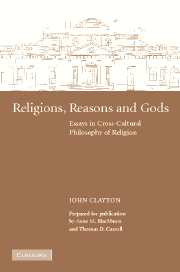Book contents
- Frontmatter
- Contents
- Editorial preface
- Acknowledgments
- List of abbreviations
- 1 Claims, contexts and contestability
- PART I REASON AND RELIGIOUS PLURALISM
- PART II THEISTIC ARGUMENTS IN PRE-MODERN CONTEXTS
- PART III THEISTIC ARGUMENTS IN EARLY-MODERN CONTEXTS
- 8 The debate about God in early-modern French philosophy
- 9 The Enlightenment project and the debate about God in early-modern German philosophy
- 10 The debate about God in early-modern British philosophy
- 11 Beyond the ‘Enlightenment project’?
- Appendix: The 1997 Hulsean Sermon
- Bibliography
- Index
8 - The debate about God in early-modern French philosophy
Published online by Cambridge University Press: 22 September 2009
- Frontmatter
- Contents
- Editorial preface
- Acknowledgments
- List of abbreviations
- 1 Claims, contexts and contestability
- PART I REASON AND RELIGIOUS PLURALISM
- PART II THEISTIC ARGUMENTS IN PRE-MODERN CONTEXTS
- PART III THEISTIC ARGUMENTS IN EARLY-MODERN CONTEXTS
- 8 The debate about God in early-modern French philosophy
- 9 The Enlightenment project and the debate about God in early-modern German philosophy
- 10 The debate about God in early-modern British philosophy
- 11 Beyond the ‘Enlightenment project’?
- Appendix: The 1997 Hulsean Sermon
- Bibliography
- Index
Summary
Parameters of the debate about God in eighteenth-century France had been set by the middle of the seventeenth century in France and the Netherlands. Disagreement among scholastics, rationalists and sceptics as to the provability of God effectively defined both the terms and the stakes in the eighteenth-century debate about the Deity. In those earlier disputes, however, the fact of God's existence was not an issue; even so, the outcome of their quibbling about the provability of divine existence was a heightened expectation of the proofs of God as évidence and a diminished confidence in the ability of any given proof to satisfy that expectation. The corrosive effects of protracted wrangling surfaced with some surprises in the debate about God among the philosophes from mid-century to the Revolution, a debate in which the fact of God was a material question in more than one sense.
PRE-ENLIGHTENMENT IN FRANCE AND THE LOW COUNTRIES
Proofs of God's existence had been integral to the scholastic project since the twelfth century; but the traditional proofs gained new prominence and authority in early-modern France and the Netherlands. Where they had been used in mediaeval scholasticism typically as viae to express the prior consensus among Christians and Muslims and Jews, they came to be treated in early-modern scholasticism as independent evidence adequate to convince ‘atheists’ of God's being.
- Type
- Chapter
- Information
- Religions, Reasons and GodsEssays in Cross-cultural Philosophy of Religion, pp. 184 - 221Publisher: Cambridge University PressPrint publication year: 2006



